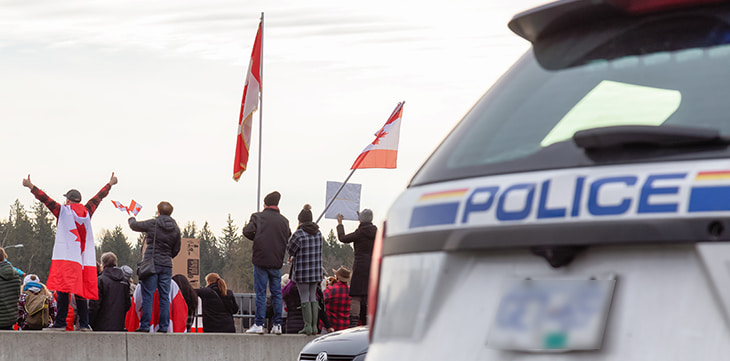|
Getting your Trinity Audio player ready...
|
Jesse Powell, the CEO of the Kraken exchange’s financial support for Canada’s anti-vaccine mandate protesters may be putting the entire cryptocurrency sector under threat of increased regulation.
This past weekend, anonymous hackers released data purportedly detailing individual donors to a campaign on the GiveSendGo crowdfunding platform. The campaign in question was launched by supporters of the ‘trucker convoy’ movement that has occupied downtown Ottawa for the past two weeks. These protests have since spread to multiple cities as well as numerous border crossings with the United States, most notably the Ambassador Bridge, paralyzing a key artery of cross-border economic trade.
Among those donating to the trucker’s cause was none other than Jesse Powell, founder/CEO of Kraken, who appears to have opened his wallet following a challenge from a fellow ‘freedom loving’ CryptoTwitter account. The fact that Powell isn’t a Canadian citizen doesn’t appear to have dissuaded him from funding the agitators, but the fact that more donations are coming from U.S. sources than Canadian seems to have awoken Canada’s federal government to the need for greater scrutiny of financial channels.
On Monday, as Prime Minister Justin Trudeau took the unprecedented step of invoking Canada’s Emergencies Act to deal with the occupations/blockades, Deputy PM Chrystia Freeland announced that the government was “broadening the scope of Canada’s anti-money laundering and terrorist financing rules so that they cover crowdfunding platforms and the payment service providers they use. These changes cover all forms of transactions, including digital assets such as cryptocurrencies.”
Freeland said the government was “directing Canadian financial institutions to review their relationships with anyone involved in the illegal blockades and report to the [Royal Canadian Mounted Police] or [Canadian Security Intelligence Service].” Government agencies will also have “a new broad authority to share relevant information with banks and other financial service providers.”
The legal text behind these orders was made public on Tuesday, although the lack of specifics contained therein have left some Canadian financial institutions still unsure as to how exactly to enforce them.
The order-in-council authorizes “measures to regulate or prohibit the use of property to fund or support the blockade, to require any crowdfunding platform and payment processor to report certain transactions to the Financial Transactions and Reports Analysis Centre of Canada [FINTRAC] and to require any financial service provider to determine whether they have in their possession or control property that belongs to a person who participates in the blockade.”
Some of these new powers will be temporary, given Trudeau’s assurance that measures would be ‘targeted, time-limited and proportionate.’ But certain changes, such as the addition of cryptocurrency platforms to those entities tasked with upholding AML rules, appear more permanent. The government will almost certainly be making a list of individuals and entities it deems to be aiding the protests, particularly foreign individuals/entities, with additional scrutiny of their future transactions a foregone conclusion.
Background
While Trudeau’s invocation of the Act may be controversial, the idea that the protests cannot continue in their current form is not. In case anyone south of the 49th parallel is misreading the room, an Angus Reid Institute survey released Monday showed that 72% of respondents want the convoy protesters to “go home now,” while 93% supported the government taking action to force them to do so. Indeed, 68% supported the police and/or military personnel using force to compel the protesters to GTFO.
Those pejorative views of the convoy likely increased following Monday’s arrests of 13 individuals at the border blockade in Coutts, Alberta, whom the RCMP said “have a willingness to use force against the police if any attempts were made to disrupt the blockade.” (Four of those arrested have since been charged with conspiracy to commit murder.) The RCMP also seized numerous weapons, thousands of rounds of ammunition, body armor and prohibited high-capacity magazines.
The claim that the protesters represent Canadian truckers is a myth. The Canadian Trucking Alliance, a national federation of provincial trucking associations, has distanced itself from the protesters, most of whom it notes “do not have a connection to the trucking industry.”
The claim that the protest is intended to remove the federal requirement for truckers crossing the U.S. border to provide proof of vaccination is undermined by the fact that the U.S. government has imposed a similar mandate. In short, Trudeau lacks the authority to unilaterally change the situation on the ground.
Also, Canada’s health care system is primarily under provincial control, meaning the vast majority of vaccine mandates are imposed by governments not based in Ottawa. This distinction underscores the notion that the protests are simply about seeking an end to Trudeau’s ability to continue governing the nation at the head of the Liberal party.
Immunized against democracy
Canada had a federal election in September 2021, which largely upheld the status quo of the previous vote and was viewed in some circles as a referendum on vaccine mandates. The fact that the protesters didn’t like the outcome of the last election doesn’t give them the right to shut down cross-border trade and occupy huge swathes of downtown real estate for weeks on end (and/or try to burn down nearby apartment buildings if the residents object to the noise).
For more evidence that the protests are about overturning a democratic vote, consider that some of the organizers held a press conference a week ago to suggest that they would be willing to form a coalition government with the main opposition parties in Parliament once the Liberals are turfed.
No one elected these protesters to a governmental role but they’ve apparently spent so much time in their self-reinforcing information silo that they presume their view represents the majority of Canadians. (Vaccine mandates were already far more popular in Canada than in the U.S., and that Angus Reid poll found that 44% of respondents said the convoy protests had made them more likely to support vaccine mandates, so nice own-goal, guys.)
On Tuesday, a group of Ottawa convoy organizers issued a plea for the Coutts truckers to “stand your ground” because “there’s help coming from the south.” Given that some of the gear seized by the RCMP on Monday featured patches related to the anti-government ‘Diagolon’ movement—which seeks to carve a new country out of territory spanning both the U.S. and Canada—one has to wonder if the ‘help’ on its way is financial or something more lethal.
To be sure, not everyone who engages in or offers material support to this month’s protests is a Nazi scumbag. Many of the Coutts protesters broke off their blockade following Monday’s arrests, saying they wanted no part of any plans for violence. But the undeniable presence of Nazi scumbags glomming on to the protesters’ cause should be enough to convince crypto luminaries to keep a respectful distance lest their organizations be tarred with that brush.
We released the Kraken, but then it bit us on the ass
That advice particularly applies to Kraken’s Powell, who previously admitted to employing money laundering tactics to evade mainstream financial platforms’ compliance requirements. On Monday, Powell offered his Twitter followers suggestions for mitigating Canada’s new crowdfunding rules, a step the Canadian government perhaps might not view through the same anarchic ‘freedommmmmmmmm, dude!’ filter.
Kraken has been fined by the U.S. Commodity Futures Trading Commission (CFTC) for offering illegal margined digital currency products to unqualified investors, while financial institutions in other markets have chastised Kraken for failing to protect consumers from fraudsters on its platform.
For what it’s worth, Payward Canada Inc, the Kraken subsidiary registered as a money service business with FINTRAC, has a decision on its hands. Specifically, its FINTRAC registration expires at the end of this month. Should they stay or should they go? In the end, given Powell’s increasingly provocative antics, that decision may not be up to Kraken.
But hey, I’m sure Kraken will be welcomed with open arms in the new Diagolon utopia.
Follow CoinGeek’s Crypto Crime Cartel series, which delves into the stream of groups—a from BitMEX to Binance, Bitcoin.com, Blockstream, ShapeShift, Coinbase, Ripple, Ethereum, FTX and Tether—who have co-opted the digital asset revolution and turned the industry into a minefield for naïve (and even experienced) players in the market.

 02-18-2026
02-18-2026 




